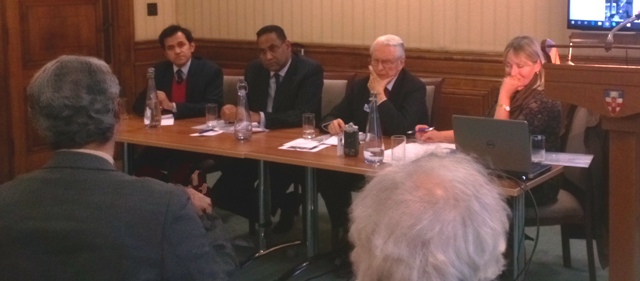 Dr Dwayne Menezes , Akbar Khan, Sir Peter Marshall and Sue Onslow take questions from the floor. [Picture: Debbie Ransome]
Dr Dwayne Menezes , Akbar Khan, Sir Peter Marshall and Sue Onslow take questions from the floor. [Picture: Debbie Ransome]
What makes a 70-year-old organisation relevant and resilient and what changes are needed to meet the challenges of the 21st Century? These were questions put to a panel brought together by the Institute of Commonwealth Studies on 29 April.
Despite the ongoing debate about whether 26 April actually marked the birthday of the modern Commonwealth, ICWS Deputy Director and panel convenor, Sue Onslow, told the audience that the Institute was marking its own anniversary with its series of ICWS@70 events.
Her panel consisted of Sir Peter Marshall, Akbar Khan, the Secretary General of the Commonwealth Parliamentary Association (CPA), and Dr Dwayne Menezes, formerly a consultant to Commonwealth Secretary-General Kamalesh Sharma and now the Managing Director of the Commonwealth Policy Development Centre.
From Empire to Commonwealth
The panellists agreed that resilience had been built into the formation of the modern Commonwealth to ensure that former parts of the British Empire joined an association which then worked for everyone. Peter Marshall described the transformation as a “win-win situation” for both Britain and newly-independent countries. He described how the modern Commonwealth had been able to replace the earlier “brinkmanship” of global politics with an organisation crafted by the 1949 Declaration. He described it as a “stroke of genius” by India’s first Prime Minister, Jawaharlal Nehru, with “one of the craftiest paragraphs in diplomatic literature” which created a pattern for attaining independence and staying in the club.
Akbar Khan of the CPA said that the “blank canvas” used to set up the Commonwealth had also created problems for setting targets. He said that independence and Commonwealth membership had provided countries with “an immediate step into the international arena”. He added that the Commonwealth only reached great heights when both the opportunity arose and the Secretary-General of the day could “seize the space” – a situation which had waxed and waned over the years. He gave credit to the Commonwealth for some of the “heavy lifting” in Africa, for the work of the Eminent Persons Group (EPG) on apartheid, and as a “pioneer” in the role of supporting small states. He referred to the wider Commonwealth family, including associations, as an “incubator for ideas” in situations such as the CPA’s work on political values. He also pointed to electoral monitoring as a “gold standard”, adding that the organisation’s role of “being the convenor should not be under-estimated”.
Dwayne Menezes also held up the Commonwealth as an organisation with an “ideal”. He said that the move from Empire to Commonwealth had not thrown the baby out with the bathwater but had, instead, only thrown out the dirty water. On the Commonwealth and its Charter, which he described as the “greatest embodiment of the highest aspirations”, Dr Menezes said that people should stop apologising and should celebrate the resilience of the modern Commonwealth. He highlighted the Commonwealth Fund for Technical Co-operation as a “respectful, very stable way” to help newly-independent countries with their capacity building and also pointed to the Commonwealth’s track record on human rights, climate change, LGBTQI rights and in giving youth a voice.
The Commonwealth’s USP
Dr Menezes said that the organisation needed to “maximise the volume” on the issues where it had made the difference. He suggested ways for an organisation run by baby boomers to reach millennials by finding ways of making Commonwealth membership meaningful, such as movement of labour, transparency in ComSec appointments and the recognition of Commonwealth degrees.
CPA’s Akbar Khan spoke of the “incredible work” the Commonwealth had achieved with limited resources. “Ask ourselves – what is our USP in a crowded world,” he said. The answer was our values. He added that these values could drive discussions on global issues and provide policy at a time “when the world is becoming more polarised”. On funding for the future, he suggested that emerging nations start to “put their money where their mouth is” to replace the expectation for the ABCs to fund the rest.
Mr Khan said that it was time to engage a younger generation by answering the question, “what can it do for me?” He spoke of younger people wanting to engage in a global world – a space which gave the Commonwealth a real opportunity to bring them on board. Mr Khan suggested that, instead of making excuses for countries which had been independent for a very long time, it was time to “call out” disrespect of human rights, LGBTQI rights and other transgressions. He added that this did not have to be through suspension but by offering a helping hand. On the Commonwealth Ministerial Action Group (CMAG), Mr Khan said that “double standards” and “inconsistency” in reprimanding countries did not help the organisation’s credibility.
In the Q&A session, panellists and the audience discussed the high level review of ComSec, how to attract the Republic of Ireland into the Commonwealth and the value today of the Commonwealth Charter.
Peter Marshall spoke of the “ifs and buts and escape clauses” in the Charter which had persuaded people to sign up to it. Mr Khan said that the Commonwealth’s accredited associations did a lot of work in the spirit of the “aspirational” Charter but that its language needed to be used more often.
Even after the formal proceedings, audience and panellists remained to discuss pragmatic ways to promote the Commonwealth and to engage a younger generation in the current role and future path of a 70-year-old organisation in a changing world.



